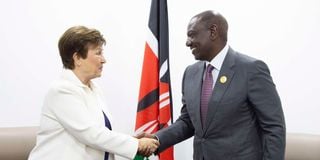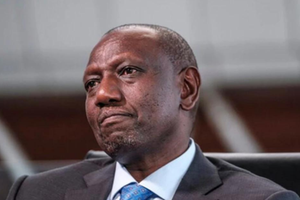Kenya’s 7th consultation with IMF: Three views, two errors

President William Ruto meets with IMF Managing Director Kristalina Georgieva.
What you need to know:
- The IMF statement says that Kenya’s ‘Headline inflation has decelerated to 5.1% in May 2024’
. As a sign of good faith, the IMF should correct these errors and reissue their statement.
No statement marking the end of a mission consultation between Kenya and the International Monetary Fund (IMF) has been as anticipated as that dated June 11, 2024, published just as the Cabinet Secretary for the National Treasury presented the Budget Statement to Parliament.
The statement had been preceded by an uncharacteristically long delay, given that the consultation had commenced in early April 2024. That gave rise to much speculation.
So attention turned directly to its contents.
Immediately surprising was the announcement that the amount of finance the IMF is offering Kenya will be reduced ‘to align closely with current needs following its access to the international bond markets earlier this year’. This will bring cumulative access to IMF funds back within “normal” limits, IMF staff suggested.
The timing, explanation, and amount of this reduction raise a raft of questions, in particular, whether or not it contains a cryptic message of IMF dissatisfaction.
Market refinance
In particular, given that the programme is scheduled to end in nine months or so and the immediate priority of securing market refinance in February for the maturing Eurobond had been achieved, the IMF may now be giving overdue recognition to our view that the programme lacked focus, had too many moving parts for effective implementation, and thus fell short of its overall stated goals.
A second view is that the recalibration simply reflects that after the bullet maturity for the Eurobond was satisfied—with everyone more or less intact—the partners have simply taken a step back to coast towards the end of the programme.
Either way, the IMF welcomed the tight stance of monetary policy which, in their view, has anchored inflation, stabilised the foreign exchange market, and thus has supported the Eurobond refinancing and the IMF’s path to the exit, at least for now.
But there is also a third view of the IMF’s action which suggests a degree of mistrust. According to that view, with more refinancing for the Eurobond secured than had been assumed, there was less need for IMF money to finance the given IMF fiscal targets.
So, given skepticism about the Kenyan authorities’ behaviour “off the leash”, the last thing that the IMF wanted to do was to accommodate the temptation by the Kenyan authorities, now flush with cash, to let their budget primary balance target slide. So the IMF took the money off the table, not least in the face of mounting public protests.
We suspect that after relentlessly campaigning internationally for more finance for the developing world as part of his International Financial Architecture Reform Agenda, President William Ruto may have been confounded as to why, having just obtained such additional finance from the Euromarket, the IMF refused to let him spend it.
Two Errors
But with the IMF message to Kenya and the world thus remaining somewhat murky, their message on two key matters was crystal clear—and numerically wrong. Given their global audience, we contend that these are serious matters.
The first of the key matters wrongly reported concerns inflation. The IMF statement says that Kenya’s ‘Headline inflation has decelerated to 5.1% in May 2024’. This is untrue: the Kenya National Bureau of Statistics report on inflation for May 2024 states that, ‘The annual Headline inflation rate as measured by the Consumer Price Index (CPI) increased to 5.1 per cent, in May 2024 from 5.0 per cent in April 2023’; and more subtle, even granted the more elevated inflation rate for March than for May, this a not a deceleration in inflation but a deceleration in prices.
The second of the key matters wrongly reported was that the “deceleration” was ‘aided by lower food prices’. Food prices have not fallen; instead the rate of food price inflation has fallen. As a sign of good faith, the IMF should correct these errors and reissue their statement.
Kwame Owino is the Chief Executive Officer of the Institute of Economic Affairs.
Maureen Barassa- Is the Programme Officer in the Popular Economics Programme of the Institute of Economic Affairs.





